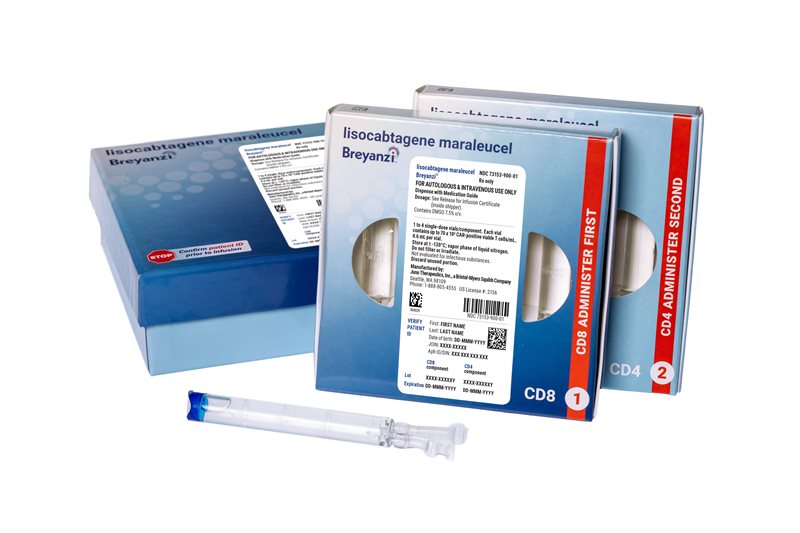US FDA Approves CAR T Cell Therapy Breyanzi for Relapsed or Refractory Follicular Lymphoma
 Bristol Myers Squibb announced the US FDA has granted accelerated approval for Breyanzi (lisocabtagene maraleucel; liso-cel), a CD19-directed chimeric antigen receptor (CAR) T cell therapy, for the treatment of adult patients with relapsed or refractory follicular lymphoma (FL) who have received two or more prior lines of systemic therapy. This indication is approved under accelerated approval based on response rate and duration of response. Continued approval for this indication may be contingent upon verification and description of clinical benefit in confirmatory trial(s). Breyanzi is also now included in the National Comprehensive Cancer Network (NCCN) Clinical Practice Guidelines in Oncology (NCCN Guidelines ) for B-cell Lymphomas as a Category 2A recommendation for third-line and subsequent therapy for relapsed or refractory FL.
Bristol Myers Squibb announced the US FDA has granted accelerated approval for Breyanzi (lisocabtagene maraleucel; liso-cel), a CD19-directed chimeric antigen receptor (CAR) T cell therapy, for the treatment of adult patients with relapsed or refractory follicular lymphoma (FL) who have received two or more prior lines of systemic therapy. This indication is approved under accelerated approval based on response rate and duration of response. Continued approval for this indication may be contingent upon verification and description of clinical benefit in confirmatory trial(s). Breyanzi is also now included in the National Comprehensive Cancer Network (NCCN) Clinical Practice Guidelines in Oncology (NCCN Guidelines ) for B-cell Lymphomas as a Category 2A recommendation for third-line and subsequent therapy for relapsed or refractory FL.
In relapsed or refractory FL, Breyanzi is delivered as a one-time infusion with a single dose containing 90 to 110 x 106 CAR-positive viable T cells. Please see the Important Safety Information section below, including Boxed WARNINGS for Breyanzi regarding Cytokine Release Syndrome (CRS), Neurologic Toxicities, and Secondary Hematological Malignancies.
“Breyanzi is a cornerstone of our cell therapy portfolio, providing a differentiated profile across a wide array of B-cell malignancies,” said Bryan Campbell, senior vice president, Head of Commercial, Cell Therapy, Bristol Myers Squibb. “Today’s approval of Breyanzi for relapsed or refractory FL provides an option with potential for lasting remission in a one-time infusion and a safety profile that allows for administration and monitoring in both the inpatient and outpatient setting in an increasing number of certified treatment centers in the US.”
Historically, FL has been considered an incurable disease, and patients frequently relapse following front-line therapy, with prognosis worsening after each subsequent relapse. Despite advances in treatment, there remains an unmet need for additional options that offer treatment-free intervals with durable, complete responses.
The Phase 2 TRANSCEND FL study included the largest primary analysis set of patients with relapsed or refractory FL of a clinical trial evaluating a CAR T cell therapy in this patient population. Based on the US Prescribing Information (USPI), in patients treated with Breyanzi in the third-line plus setting and included in the primary efficacy analysis set (n=94), the overall response rate (ORR) was 95.7% (95% CI: 89.5-98.8). ORR was defined as the percentage of patients achieving a partial or complete response per Lugano criteria as assessed by an Independent Review Committee (IRC). The complete response (CR) rate was 73.4% (95% CI: 63.3-82.0) and required a negative bone marrow biopsy for confirmation. Responses were rapid and durable with a median time to response of one month (range: 0.6-3.3) and median duration of response (DOR) not reached (95% CI: 18.04-NR), with 80.9% of responders remaining in response at 12 months, and 77.1% of responders remaining in response at 18 months. Results from the primary analysis of TRANSCEND FL presented at the 2023 International Conference on Malignant Lymphoma showed an ORR of 97% (95% CI: 91.6-99.4; one-sided p<0.0001) in efficacy evaluable patients (n=101), with 94% of patients achieving a CR (95%CI: 87.5-97.8; one-sided p<0.0001).
“In the treatment of relapsed or refractory follicular lymphoma, patients often cycle through treatments with typically shorter responses with each new line of therapy. Those who have experienced early disease progression have notably poor prognosis,” said M. Lia Palomba, M.D., TRANSCEND investigator and lymphoma and cell therapy specialist, Memorial Sloan Kettering Cancer Center. “The FDA approval of liso-cel for patients with relapsed or refractory FL is an important advancement in addressing an ongoing unmet need in the FL treatment paradigm, providing patients a new option that has shown remarkably high response rates and an established safety profile.”
Breyanzi has exhibited a consistent safety profile and across clinical trials, any grade cytokine release syndrome (CRS) occurred in 53% of patients, including Grade >3 CRS in 4% of patients. The median time to onset was 5 days (range: 1 to 63 days). Any grade neurologic events (NEs) occurred in 31% of patients, with Grade >3 NEs occurring in 10% of patients. The median time to onset of NEs was 8 days (range: 1 to 63 days). The safety profile of Breyanzi allows for the option of outpatient treatment and management of patients. Patients in the TRANSCEND FL study were treated in the inpatient and outpatient setting.
“The lymphoma community has felt an urgent need for advancements in the treatment of relapsed or refractory follicular lymphoma,” said Meghan Gutierrez, chief executive officer, Lymphoma Research Foundation. “The approval of Breyanzi offers patients a new and meaningful treatment option that provides hope for lasting remission, and we are grateful to those who have contributed to this exciting milestone for patients.”